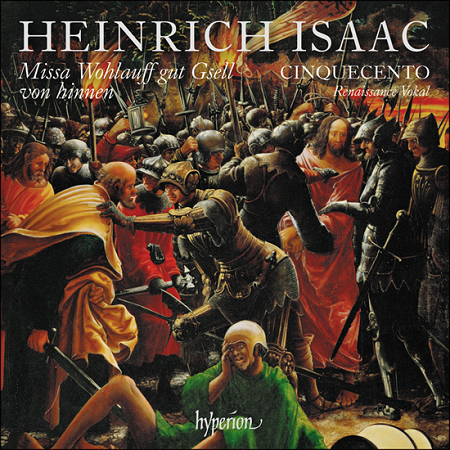After hearing this excellent disc which Cinquecento have devoted to the music of Heinrich Isaac, I was compelled to find other recordings. How seldom the music of this Flemish-born composer (c.1450-1517) has been recorded across some 50 years came as a surprise. There’s an isolated mass and a selection of motets each from Capella Antiqua München (1969), The Hilliard Ensemble (1983) and The Tallis Scholars (1991). And, since the millennium, one will find just a handful of continental outfits, including Jordi Savall’s Hespèrion XXI, that have explored this repertoire.
Of over 30 masses and a three-volume collection of motets, Choralis Constantinus, published in the 16th century (and prompting a critical edition by Anton Webern in 1906 for his doctoral thesis), only a modest group have been recorded – a tragic neglect of a composer who once dominated the musical life of the Hapsburg court in Vienna between 1497 until his death in 1517. Highly regarded too, by all accounts, with one admirer supporting him in a job application: ‘To me [Isaac] seems well suited to serve Your Lordship, more so than Josquin, because he … will compose new works more often. It is true that Josquin composes better, but he composes when it pleases him and not when one asks him to do so.’ In the event the Duke of Ferrara hired Josquin, preferring prestige over productivity. Overlooked then, and still in Josquin’s shadow four centuries later. Even the novelist Aldous Huxley sought to improve his reputation in his 1960 essay Gesualdo: Variations on a Musical Theme, citing Isaac as one of the great unjustly forgotten composers of the Renaissance.

But the superb European vocal ensemble Cinquecento (usually just five voices) will stir things up a bit, and Hyperion have done them proud. Tuning and blend are immaculate, and there’s a sumptuous luminosity to the polyphony and plenty of forward momentum. The countertenor Terry Wey floats seraphically above his colleagues who are all perfectly immersed in Isaac’s varied textures. Crystalline detail and beautifully moulded phrases come as standard.
The main work is the Missa Wohlauff gut Gsell von hinnen conceived for six voices and one of the composer’s longest and most opulent masses. It is variously scored from three to six voices, and such is Isaac’s resourcefulness (not least the ingenuity of his canonic writing) that rarely does the same vocal combination occur successively. The Mass is an adaption of an earlier four-part setting, itself based on a popular contemporary song Comment, peult avoir joye? – hence the inclusion of Josquin’s motet of the same name. Of the many arresting passages within the Mass, I would mention the false relations of ‘Kyrie II, the intimacy of ‘qui tollis peccata mundi’ (within the ‘Gloria’) and the remarkable swinging rhythms for ‘Confiteor una Baptisma’ at the end of the ‘Credo’, itself beginning surprisingly with just three voices. Then there’s the expansive unfolding of the ‘Sanctus’, (notwithstanding some intrusive tone from one of the tenors), the bell-like sonorities of the second ‘Osanna’, and two basses rising from the depths at the start of the second ‘Agnus Dei’.
Among the half dozen motets variously written for four and five voices, Cinquecento respond keenly to the striking imagery within Quis dabit pacem populo timenti? Unlike the other devotional settings, this text is borrowed and adapted from the ancient poet Seneca and re-purposed to commemorate the death of Lorenzo de Medici. Accordingly, praise for this celebrated Florentine patron will only cease when ‘the icy bear’s star’ descends into the sea. A glorious piece and vividly conveyed. More substantial is the two-part Marian motet O decus ecclesiae that stands out for its length (some 12 minutes) and elaborate word-painting. Melodic branches extend like fresh shoots to evoke the spread of Mary’s name (track 30) and spiral in circular fashion at the close to capture the crown on her head. No one hearing this extended motet can be in any doubt as to its splendour or the musicianship of its execution. These wonderful performances will surely promote a better awareness of a composer who deserves a far wider discography. More please like this.
David Truslove
Cinquecento: Terry Wey (countertenor), Achim Schulz, Tore Tom Denys, Jan Petryka* (tenors), Tim Scott Whiteley (baritone), Ulfried Staber (bass) *Mass only
Isaac – Missa Wohlauff gut Gsell von hinnen; Recordare, Jesu Christe; Quis dabit pacem populo timenti?; Sive vivamus, sive moriamur; Parce, Domine, populo tuo; O decus ecclesiae; Judaea et Jerusalem; Josquin – Comment, peult avoir joye?